
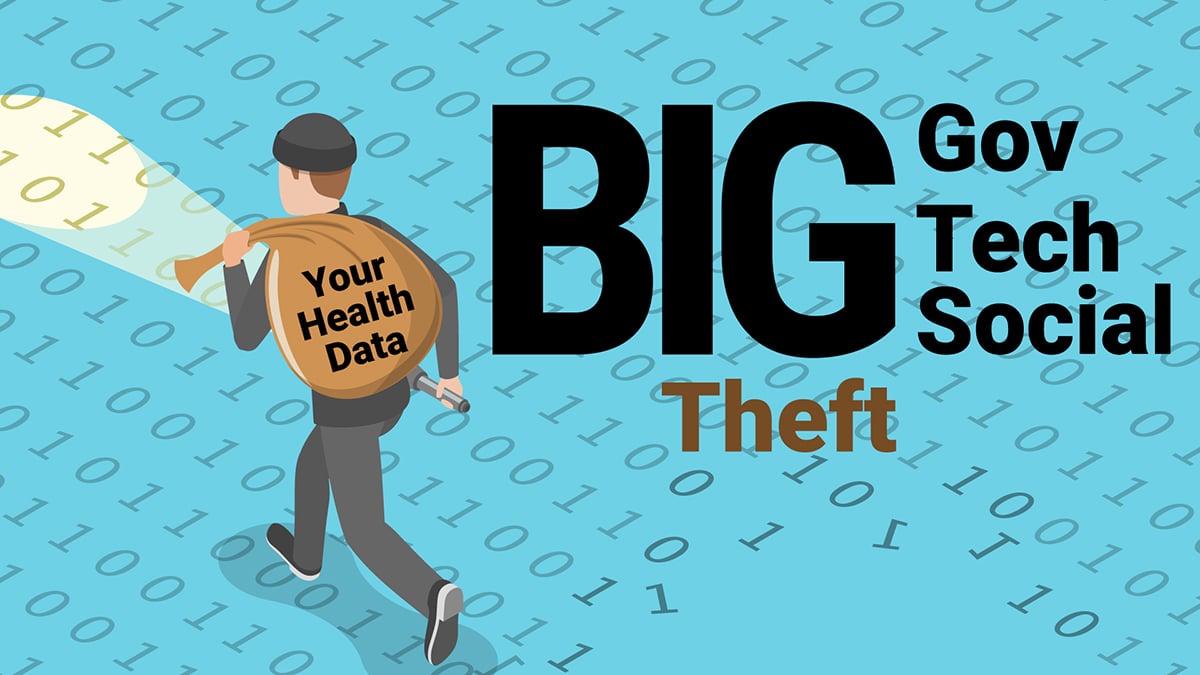
Your health data – exploitation of the most precious commodity
by Rob Verkerk PhD; founder, executive and scientific director, ANH-Intl | Dec 9, 2022
Data – as intangible as it might seem – has fast become the world’s most valuable commodity. Tangible commodities like ‘black gold’ (oil) – think here of oil giants like Exxon Mobil, BP and Chevron – will be in decline given the environmentally justified push against fossil fuels. Stocks in computer hardware (think Apple, Lenovo, Dell, etc) and software (think Microsoft, Oracle and Adobe) have grown immeasurably over the last few decades, but as we approach saturation in some markets, growth is slowing.
That’s not an issue when we look at the current and projected growth of the Internet of Things (IoT), that rash of connected devices and technologies that’s set to be a major driver of what Klaus Schwab – the founder of the World Economic Forum – describes as the ‘fourth industrial revolution’. And for the data that’s stored on, and shared between, IoT devices and their respective software – some of it likely being your data – there’s no plateau in sight.

The Internet of Things (IoT), ‘connected’ cities, digitised humans – the projected shape of things to come.
It’s all about the data
Below are some stand-out numbers that relate to ‘connected’, IoT devices that TechJury has collated from Statista:
- 44 billion – the number of IoT devices expected to be installed by 2025 worldwide
- 22 – the current average number of connected IoT devices per US household
- $1.6 trillion – projected end-user spending on IoT devices
- 4 zettabytes (= 79.4,000,000,000,000 Gigabytes) – the estimated amount of data that will be consumed by connected IoT devices in 2025.
The fact is, the global data revolution is well and truly here and continues to grow at warp speed. History books tell us over and again that as soon as a new commodity becomes highly valued, corruption, greed and exploitation will surface. Guaranteed.
It happened in North America in the late nineteenth century with the ‘gold rush’ – and it’s happening today in Africa with the same, still highly valued commodity, as well as with other minerals (notably lithium, manganese, nickel and cobalt) for electric vehicles.
While you might still be reeling from the sheer scale of the numbers relating to data that are now, or soon will be, shared across the internet, it is health data – and medical data – that will soon become the most precious of all commodities. The reason is simple for the architects of the fourth industrial revolution: the more you know about people, the more you’re able to control them.
As alien as this objective might be to some of us who value human autonomy and independence, for those who have assumed leadership over the human race through tyranny or election (whether fair or rigged), control over others appears to be the most coveted aspiration. It seems that some who have satiated their appetite for wealth, must then move on to pursue power over others.
Before bolstering my view that it’s now of paramount importance that we all appreciate the extent to which governments, tech companies and other corporations are likely to go to get their hands on our personal data, particularly that linked to our health, I need to take you on a short journey on the global status of authoritarianism, human population dynamics, and alleged justifications for public manipulation and control. The reasons will become apparent.

Do we know who’s got access our data? And what they’re planning to do with it
Global authoritarian creep
The Economist Group’s Democracy Index provides us with a running metric that shows that democracy is now something of a rarity, with just 6% of the world’s population, in just 21 countries, benefiting from what it describes as “full democracies”. The trend towards declining democracy and rising authoritarianism is even more disconcerting. Disturbingly there are nearly 3 times as many countries, containing nearly 40% of the global population, that are currently governed by authoritarian regimes, compared with the ones that operate “full democracy” (59 versus 21).
As we move towards ever more authoritarian systems of governance, governments and the mega corporations that have assumed control over the media, information (data), communications, the food supply, medicines and health products, amongst other things, want control over the people. That means manipulating them in ways that make them behave predictably for the benefit of those who have assumed control. That, in turn, means ‘they’ wish to understand as much as they can about ‘us’.
Sizing up the world’s population
Some might argue that the desire to control populations around the world is inevitable because there are now, put frankly, just too many people on the planet. Perhaps it’s akin to trying to run a school class of 50 kids without any rules when the classroom is only designed for 30?
This population explosion, manifested through exponential growth, has happened so suddenly in human evolutionary terms (Fig. 1) that we now need – we are told – to change our systems of governance on the planet. Global control is now necessary. The head teacher of the overcrowded school, it seems, needs to assert authority and rule with iron fist, keeping everyone on tight reins. Does that sound reasonable to you? (Not me either).
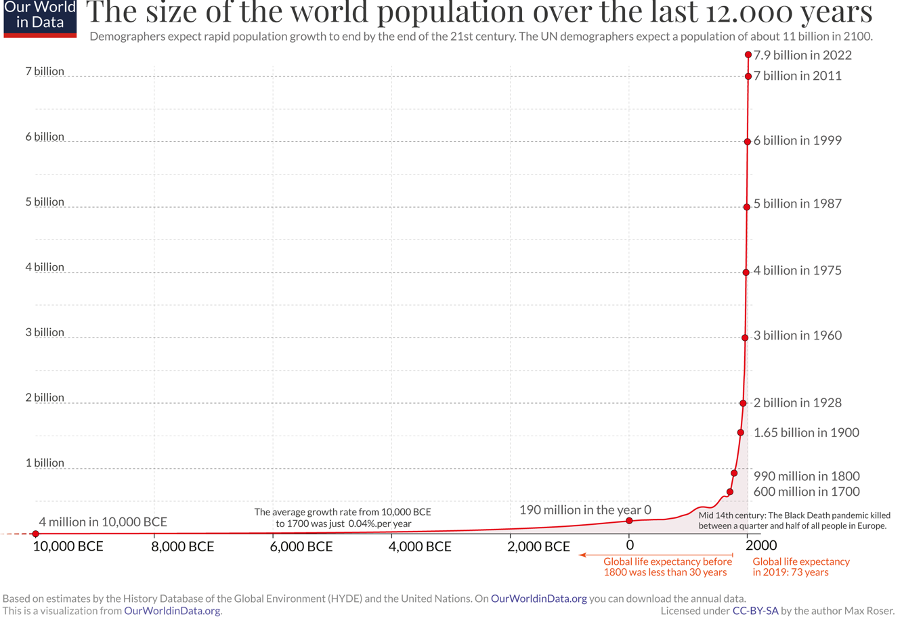
Figure 1. Estimated human population over the last 12,000 years. Original data from the Hyde database and the UN. Source: Our World in Data.
What is less discussed is that this exponential population growth has been far from even around the world. The fastest recent growth has been seen in parts of Asia and Africa (Fig. 2), with most of the industrialised world having transitioned to much reduced growth over the last 20 years. What’s more, world population as a whole is projected to dip into negative growth before the end of the century (Fig. 3).
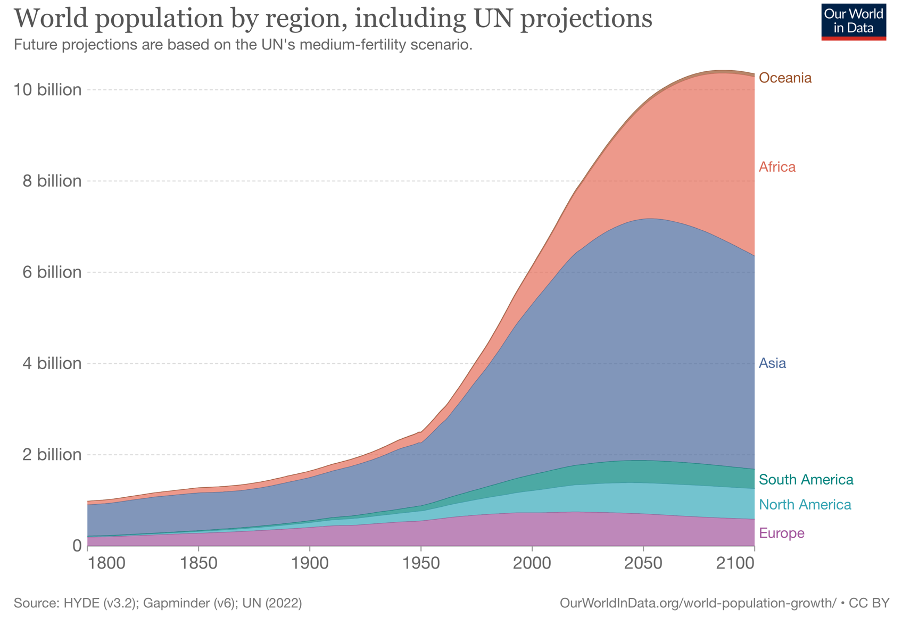
Figure 2. World population growth by region, including UN projections from 2022. Source: Our World in Data.
Population doubling times are also set to increase imminently (longer doubling times = slower growth) after reaching their minimum duration between 1987 and the present (~12 years). The latest UN projections suggest human populations will peak at 10.4 billion in 2086, and decline thereafter.
In terms of the progression of our species on planet Earth, we’re presently likely to be pretty much at the point of ‘peak human’. What we have less idea about is whether the future holds a population crash for our species (par for the course with other species that experience exponential population growth well beyond their environment’s ‘carrying capacity’) or a levelling out of numbers. That may well depend on what happens during these critical, upcoming decades.
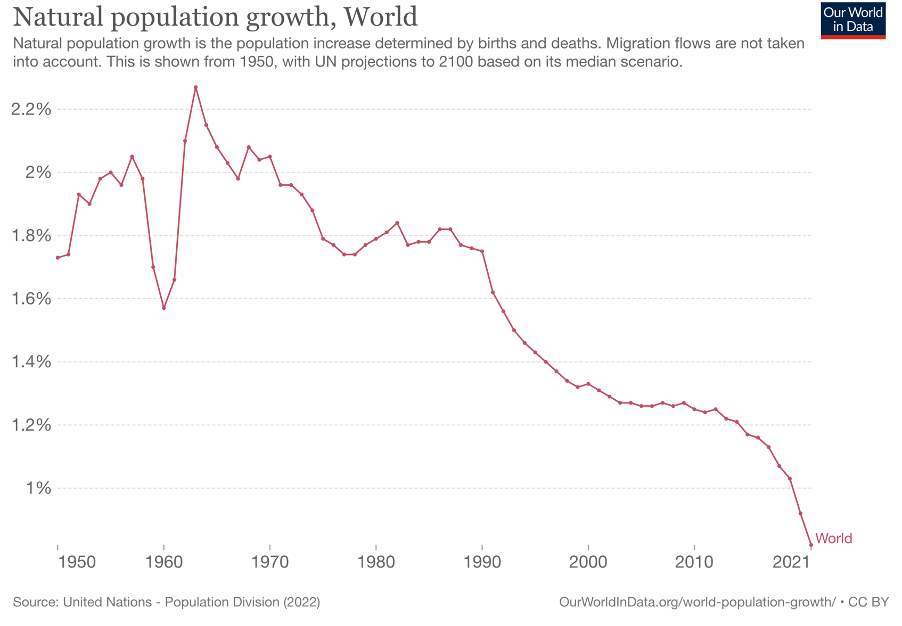
Figure 3. Declining natural (true) global population growth (taking into account the effects of births and deaths). Source: Our World in Data.
What controls population dynamics?
Now for a very cursory lesson on population dynamics (a subject with which I was intimately familiar during my academic years). There are only four factors that regulate population growth, whether we’re talking about microbes in a Petri dish, grazing herbivores on a wild savannah, or people in given region or country.
These are simply the relative rates of:
- Births
- Deaths
- Immigration, and
- Emigration
Given we’ve yet to be aware of any significant human emigration from planet Earth (although Elon Musk has some ideas on this), global population is only affected by two of these factors; namely birth and death rates.
While lifespan is key – and the lengthening of human lifespan is crucial to recent population growth – lifespan is actually just a function of the difference between birth and death rates and how this in turn impacts demography and reproduction.
With all of this in mind, it’s not hard to understand why we’re seeing so many efforts placed on controlling movements of people (i.e. immigration and emigration) and why there has been relatively little research effort expended on lengthening human lifespan. This field of anti-ageing medicine has remained a fairly obscure, and sometimes controversial, sideline in mainstream medical circles. Where it does exist, it usually does so as a sub-discipline of gerontology.
Any factors that reduce fertility and birth rates, especially if they also increase mortality rates, can have profound impacts on reducing human populations. Here it has become clear that factors associated with industrialisation in the eighteenth century and beyond, including improved sanitation, basic hygiene, better maternal and ante-natal care, as well as improved nutrition, have been major drivers of population growth. These all contributed to reductions in infant, child and adult mortality while also contributing to increased pregnancy success.
We could ask ourselves: what factors in recent times could turn the tables on population growth, by both decreasing birth and increasing death rates? Could covid-19 and associated government measures be a candidate? Was this a test bed for what’s to come?
Such concerns go beyond speculation and couldn’t be more relevant to the public interest. Yet, farcically, any attempt at serious discourse on such matters gets labelled as ‘scientific misinformation’. We should take particular note of the gargantuan efforts that have gone into trying to avoid mass communication of science that points to the impacts of covid-19 vaccines on pregnancy loss (miscarriages, spontaneous abortions and stillbirths) when related to covid-19 genetic vaccines – especially given their incredibly widespread administration, including the specific targeting of pregnant women. Should we also be concerned over data suggesting complex impacts of covid-19 infection, ‘long covid’ (and potentially C19 ‘vaccines’) on fertility and reproduction, and the seeming urgency of getting these improperly evaluated ‘vaccines’ into babies as young as 6 months when SARS-CoV-2 poses no discernible risk? We’d say so.
There are many other possible factors that could also contribute to changing human population dynamics. Could social distancing, school closures and subsequent isolation (as a covid-19 prevention measure) have impacted significant numbers of youngsters at critical ages in ways that impair their social development which, in turn, might reduce their ability to form relationships that would lead to reducing what we biologists refer to as ‘reproductive success’?
How about the way a few years of austerity (cost of living crisis + energy crisis + inflation), that we’re all being told to be prepared for, could impact human reproduction? Will children who grow up with an ever greater number of virtual relationships on their digital devices be less successful in finding real-world mates? There are a multitude of relatively poorly understood physiological, psychological, social, economic, cultural, technological and political factors that influence human fertility and reproduction, and it’s too early to know how much impact the new systems of globalised, AI-informed, digitised world will pan out.
What’s for sure, all of these seemingly marginal impacts on birth and death rates could amount to potentially big impacts on the dynamics of a country’s, or even the world’s, population. A planet with fewer people on it is of course not necessarily a bad thing given the limitation of finite natural resources and the destructive and polluting nature of human activity. If this is the goal, surely the ways in which it is achieved could pose serious ethical dilemmas for our species (did you ever see the 1973 dystopian, ecological thriller, ‘Soylent Green‘ that depicts future events, in 2022!?). Yet recent censorship that’s been onboarded alongside covid-19 prevents any such public discourse.
Controlling the public by appealing to survival instincts
We were told that the risk of terrorism, in the wake of 9/11, was reason enough to beef up surveillance, especially between borders (remember: population movements across borders is your pragmatic measure of emigration and immigration – the other two factors governing population growth).
Then came covid-19, and, almost overnight, there was a perceived need for massively increased in-country surveillance (including genetic surveillance). Transitioning public concerns over national security to ones concerning health security was almost seamless – aided and abetted by a disease agent that was quite likely developed in a lab. One of the leading UK authorities responsible for managing the pandemic even changed its name from Public Health England (PHE) to the UK Health Security Agency to encompass its broadened remit including ‘health security’ functions like ‘track and trace.’
Population surveillance has been pushed to new levels courtesy of covid-19, that, presently does not pose, in relative terms, a serious threat to life. This heightened surveillance required that the World Health Organization (WHO) declare a Public Health Emergency of International Concern (PHEIC), as well as pandemic status. Key to maintaining control over populations was ensuring these statuses could be maintained irrespective of the risk posed to human beings. The WHO itself determines the scientific criteria for its controversial definition of a pandemic that is the precursor of a globally coordinated response and extensive population surveillance. While these are scientific criteria that affect billions of people around the world, any notion that they should be subject to scientific peer review has been suspended by those who have established the agenda. Instead, the public is led to believe that governments are simply “following the science”. Hardly.
Conveniently for those wanting to inflame concerns about new infectious disease risks, none of the criteria built into the definition of a pandemic relate to the actual risk a pathogenic agent might pose to human health or human survival. In fact, the lack of clear definitions leads to considerable confusion and may be part of a deliberate ruse that allows PHEIC and pandemic status to be used as a political, rather than a public health, tool.
The mainstream media have waited until the evidence was unassailable before they would carry the message, such as that from Professor Mark Woolhouse in the Gates Foundation-funded Guardian newspaper in the UK, that lockdowns caused more harm than good. Yet many of us were aware these risks would become very real once the pandemic was declared by the WHO — on 12 March 2020.
Manipulating the public
Behavioural and social scientists know better than most that the most powerful drivers any of us have in life relate to our own survival and that of those closest to us. Therefore if you want to surveil the public at large, you have to appeal to their survival instincts. Making them fearful of terrorists or new infectious agents, both of which have the potential to kill, is undoubtedly going to appeal as a firstline approach.
But history tells us that in order to get the political or social response you want by instilling fear into the public, you need to blow your warning trumpet pretty hard. In fact you might well have to overblow it (which means you need to lie a bit, or even a lot).
We saw this with Blair and Bush’s declaration of war on Iraq, falsely justified on the basis that evidence of the existence of weapons of mass destruction was “beyond doubt”, when in fact it was lacking.
Before covid-19, there were of course the other diseases set to become global plagues – from mad cow disease through to bird flu, swine flu, SARS and MERS. Since covid-19 assaulted us, let’s not forget there’s also been monkeypox. Now we have a bacterium in the mix: strep A causing scarlet fever. Worry not, the public is on high alert for any existential, microbial threat! Once primed, all you need do is present a solution. In the UK, the public has been informed of the ‘desperate need’ for a vaccine, and lo and behold, antibiotics are at hand if you can get hold of them – and strep A vaccines are in the pipeline. Absurdly, it is these kinds of pharmaceutical solutions that put yet more money in pharma’s coffers that always seem to be prioritised over immunological research that, for example, better explains why so many of us carry strep A without any hint of disease.
The classic modus operandi that ensures a compliant public involves overplaying the public health risks of the perceived threat. This was seen a few years back in the case of swine flu. PCR and other molecular tests that involve taking samples of genetic material, as well as monitoring vaccination status (covid-19 for now) at borders or even in venues, institutions and companies, as well as contact tracing apps, will likely remain a key means of population surveillance. Despite the declining risk profile of covid-19, they probably won’t be dropped readily in the 59 countries that contain 37.1% of the world’s population that have already adopted authoritarian regimes. Perhaps not even in those with hybrid systems that are moving steadily towards full-blown authoritarianism.
Selecting your tribe
The scene has been perfectly set over the last few years to make the public exquisitely receptive to manipulation. This is made all the more remarkable given the spectacular failure of government measures, ranging from face masks, to lockdowns and genetic vaccines (you can find dozens of articles on all of these issues and more in our curation of the over 250 articles on the subject on our website).
Behavioural, cognitive and social psychology have informed us that our allegiance to a particular in-group, one that makes us feel safe, can be much more powerful than our allegiance to the truth. It’s what Polish social psychologist Henri Tajfel, and colleagues, referred to as ‘in-group favouritism‘. The bonds within this “us” group can be very difficult to sever, as can any desire to understand or acquiesce to the concerns of the outgroup (“them”). Strange as it might sound, the fact that the major planks of the in-group’s arguments may have been unanimously agreed to have been false or flawed, while those of the out-group proven to be correct, makes not a jot of difference to allegiances. It’s a matter of tribe over substance.
Coming full circle – Big Brother is watching you
Having set the scene for why and how those who control the ways of the world feel the justification to control us, let’s come back to the data that defines us – especially our health, our values, and our physical movements.
When it comes to your geographic movements, whenever we move across borders, we’re tracked at immigration. That’s been the case for years but data are getting ever more joined up internationally and artificial intelligence (AI) is being used to evaluate it in ways that didn’t previously exist.
A couple of examples. Here’s the global data on asylum seekers to the nearest 5 individuals. And here’s the estimates for illegal immigrants around the world – the ones who were intent on not being recorded.
What about your movements within the country you live in? Ever used Google Maps or equivalent? Well, that’s how they see what we’re up to. Google watched as we obeyed or disobeyed lockdowns and published its findings in its Community Mobility Reports. Find out what Our World in Data (heavily funded by the Gates Foundation) wrote about it here.
When we do our weekly food shop – who gets out data. If we are enticed into a reward card because you’ve been attracted by the possibility of perks, think how your shopping choices get linked to your address, you, and all the other associated data.
What about any fitness trackers you might be using? Your heart rate, your weight, your height, your age and your physical activity expenditure, all tell any party that has your data a lot about your health status. Have you read the small print of the company that holds your data? Ah – you use a Fitbit – and where does your data end up? Google? Actually yes, because, guess what? Fitbit was bought by Google in January 2021.
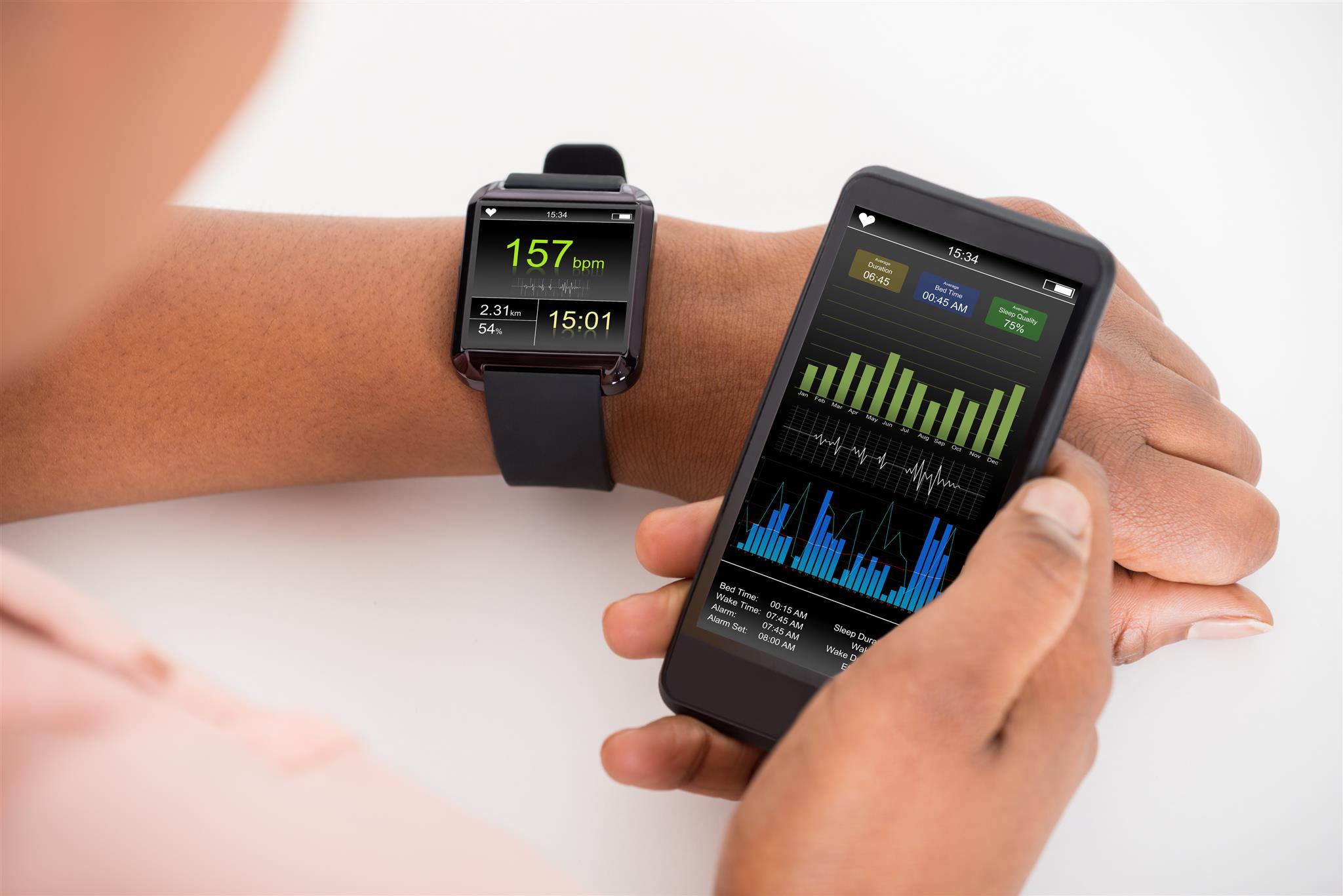
Some fitness tracking apps are not just for your benefit.
There are myriad other ways people are being tracked, with accompanying privacy and confidentiality breaches. In fact, data breaches are now commonplace. Examples include energy smart meters, and search engines with cookies. Using these are optional, not compulsory.
Big Social – including Facebook, Instagram and Twitter – also play a crucial role in our surveillance (if we use these platforms). That’s how they monitor protests and feed information to police. It’s how their AI systems crack down on information they deem as counter-productive to their aims, including scientifically accurate and relevant information on matters such as vaccination injuries, that are censored after being designated as ‘medical misinformation’, regardless of their accuracy.
All in all, the gameplan is becoming ever more clear. There’s a small group of people who’ve got a well developed, weakly justified plan, to control us. A big part of this plan is to get us to do certain things that keep us enslaved to a system that prevents us being truly independent and autonomous. It also entices us to spend our hard-earned money or taxes on things that maintain the status quo. That includes maintaining the current dominance of pharmaceutical corporations, banks, and food suppliers, to name just a few.
Big Tech including companies like Amazon are increasingly becoming actors in the healthcare sector as the digital, tech, health and big data worlds progressively fuse ever closer together. Big Social and Big Media have become major facilitators.
The more data we give away to companies and organisations that have little respect for data privacy, the more power and independence we relinquish. It’s a very slippery slope.

Breaking free from the Big Gov/Big Corporate Complex requires we maintain our independence and autonomy.
What now?
The first step to our autonomy and independence is our awareness. Understanding at which points our data might be exploited to our detriment and to the benefit of those who wish to control us, is a good starting point.
If any of this concerns you, here’s my pick of six things that I rate as among the most important to do:
- If you don’t want your spending to be tracked, pay with cash – and certainly avoid using store cards or reward cards
- When you don’t want to be tracked, turn off location services on your phone and consider using a location spoofer such as Dr Fone for iOS to give a fake location
- Read the small print of any company organisation to which you provide data, including health and fitness tracking apps. Avoid using the product or service if data privacy and anonymity are not guaranteed
- Avoid using an energy smart meter or cloud-based virtual assistants (e.g. Alexa) that monitor you 24/7
- Turn your mobile phone off when you don’t want to be monitored – including at night (you don’t need to use your phone as an alarm clock, alarm clocks are still being manufactured and are readily available!)
- Run a data breach search using your email address, such as this one. If your email is subject to a breach, change your email address and password.
If you’re anything like me and you’re determined to maintain your access to natural health products, possibly because your health and survival depends on it, you will now have to work hard to protect your independence and autonomy. Being a passive participant in the IoT revolution that’s coming at us thick and fast is simply not going to cut it.
Or, if you’re unlike me, you might be happy to give up your personal sovereignty, and accept the healthcare solutions that are provided to us by governments and the mainstream medical establishment (principally pharmaceuticals and vaccines, of sorts). You might even find the notion of Universal Health Coverage as defined by the WHO appealing.
My take is that if this is allowed to happen through our passivity or silent acceptance, this will open the door even more widely to new-to-nature, gene-altering drugs, vaccines and reactive, symptom-focused, mainstream services. Diversity in choices would be eroded and the dysfunctional, allopathic model of healthcare and Big Pharma would prevail and even increase its dominance. This trend will always work against the interests of natural health, complicating or even hindering our access, perhaps indefinitely, to natural means of health management and regeneration that got humanity to this point.




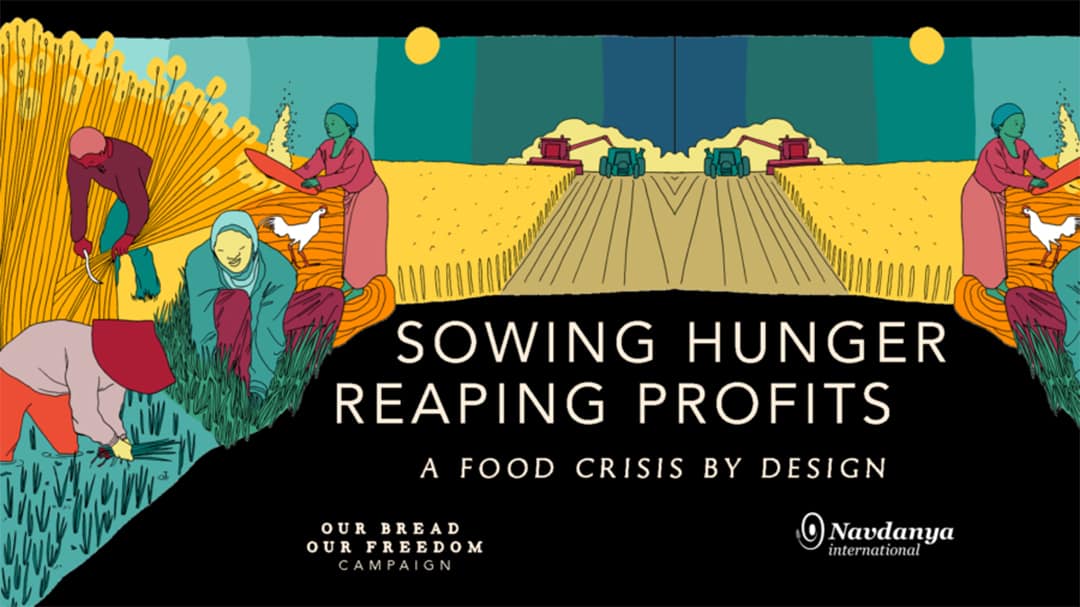
0 Comments